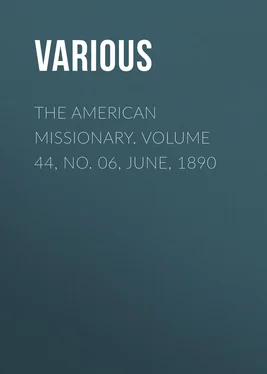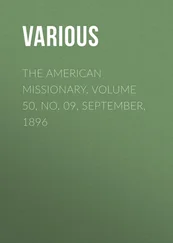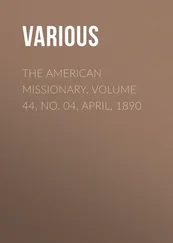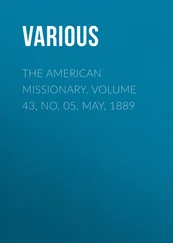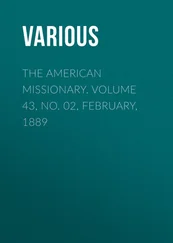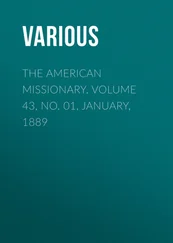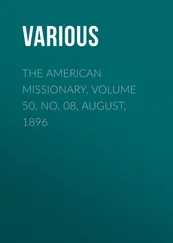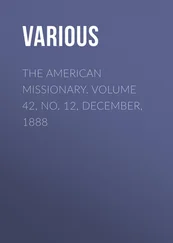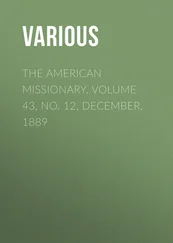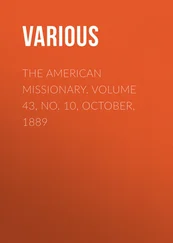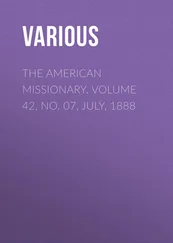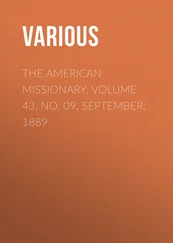Various - The American Missionary. Volume 44, No. 06, June, 1890
Здесь есть возможность читать онлайн «Various - The American Missionary. Volume 44, No. 06, June, 1890» — ознакомительный отрывок электронной книги совершенно бесплатно, а после прочтения отрывка купить полную версию. В некоторых случаях можно слушать аудио, скачать через торрент в формате fb2 и присутствует краткое содержание. Жанр: foreign_antique, periodic, foreign_edu, на английском языке. Описание произведения, (предисловие) а так же отзывы посетителей доступны на портале библиотеки ЛибКат.
- Название:The American Missionary. Volume 44, No. 06, June, 1890
- Автор:
- Жанр:
- Год:неизвестен
- ISBN:нет данных
- Рейтинг книги:3 / 5. Голосов: 1
-
Избранное:Добавить в избранное
- Отзывы:
-
Ваша оценка:
- 60
- 1
- 2
- 3
- 4
- 5
The American Missionary. Volume 44, No. 06, June, 1890: краткое содержание, описание и аннотация
Предлагаем к чтению аннотацию, описание, краткое содержание или предисловие (зависит от того, что написал сам автор книги «The American Missionary. Volume 44, No. 06, June, 1890»). Если вы не нашли необходимую информацию о книге — напишите в комментариях, мы постараемся отыскать её.
The American Missionary. Volume 44, No. 06, June, 1890 — читать онлайн ознакомительный отрывок
Ниже представлен текст книги, разбитый по страницам. Система сохранения места последней прочитанной страницы, позволяет с удобством читать онлайн бесплатно книгу «The American Missionary. Volume 44, No. 06, June, 1890», без необходимости каждый раз заново искать на чём Вы остановились. Поставьте закладку, и сможете в любой момент перейти на страницу, на которой закончили чтение.
Интервал:
Закладка:
Various
The American Missionary – Volume 44, No. 06, June, 1890
REMOVAL
The Rooms of the American Missionary Association are now in the Bible House, New York City. Correspondents will please address us accordingly.
Visitors will find our Rooms on the sixth floor of the Bible House, corner Ninth Street and Fourth Avenue; entrance by elevator on Ninth Street.
DR. STORRS, ON THE NEGRO PROBLEM
Not long since Rev. R.S. Storrs, D.D., preached a sermon in his own pulpit, presenting the claims of the American Missionary Association for the annual collection in its behalf from the Church of the Pilgrims, Brooklyn, N.Y. This sermon appeared in print in one of the daily papers, and attracted the attention of a benevolent gentleman deeply interested in the Christian education of the colored people, who was so impressed with the great value of the address, that he has furnished the Association with the means to print a large edition for general circulation. This we have done, and we presume that already, many of our readers have had the opportunity of reading this eminently wise and timely utterance on one of America's greatest problems. Should any one desire an extra copy, we will gladly furnish it on application.
Although the discourse has had large circulation, we cannot resist the temptation to extract a few of its forcible utterances on some very important points.
Permanent popular liberties have their only sure foundation in sound moral conditions practically universal. We must secure these among those to whom we have given the ballot, and who are to be henceforth citizens with ourselves. Otherwise, we are building our splendid political house on the edges of the pestilential swamp from which fatal miasmatic odors are rising all the time. Yes, we are building our house on piles driven into the thick ooze and mud of the pestilential swamp itself. We are building our cities, which we think are so splendid, and which are so in fact, as men built Herculaneum and Pompeii, on a shore which ever and anon trembled with earthquake, over which was hung the black flag of Vesuvius, and down upon which rolled, in time, the lava floods that burned and buried them.
We have got to meet this immense problem, which is not far off, but right at hand; which is not a problem of theory, or of distant history, but of practice and fact; and which concerns not the well-being alone, but the very life of the nation. Noble men and women at the South are engaged in it already, with all their hearts; and we must help, mightily! It would be the craziest folly of the age for us to be indifferent to it.
Some men may say, perhaps, "But this is a work that cannot be done. It is too radical and vast to be hopefully attempted." Nonsense! There is no work for the kingdom of God and the glory of His name, which cannot be done! With the Gospel in our hand, we can do everything.
There has been a good beginning made already. This Society, to which we are to contribute to-day, the American Missionary Association, has four established colleges, three of which are entirely supported by itself, have been founded by it and are carried on by it; and the fourth very largely so. It has multitudes of high schools, normal schools and primary schools.
First of all, we want men trained, and women too, in the knowledge of the truth as it is in Christ, and then to have them teaching others. And that is precisely the line along which the Society to which we are to contribute to-day, as we have done gladly and largely heretofore, is carrying its incessant operation.
Now I affirm absolutely that if ever there was a work of God on earth, this is his work! If there was ever anything to which the American Christian people are called, they are called to this. If there was ever a great opportunity before the Christian church, here it is.
Ah, my friends, don't say "It is too great a work." It is going to be done! You and I may do or may not do our part in it. It is going to be done!
MISSIONARIES TO ALASKA
As announced in the last number of the MISSIONARY, we have appointed two men as missionary teachers for the new station to be opened at Point Prince of Wales, Alaska. The names of these brethren are H.R. Thornton, of Hampden Sydney, Virginia, and W.T. Lopp, of Valley City, Indiana. The credentials furnished by these young men are very satisfactory, and they enter upon the field with the full realization of its difficulties and even dangers, and yet, cheerfully trusting themselves to the hand of God, are ready to go forward with undaunted faith. We bespeak for them the prayers of God's people. It is expected that they will leave home about the middle of May and sail from San Francisco June 1st. Dr. Sheldon Jackson and Dr. Pond will aid them in providing materials for the building and the necessary outfit. They will, therefore, be well provided for, though long months must elapse before they can again have communication with the civilized world.
IN A NUTSHELL
There are some people who seem to see only the ignorance and vice of the Negro, and the inveterate race-prejudice against him; or at least they appear to be so occupied in dilating upon these hindrances that they have no time to devote to their removal, and, so far as their influence goes, they discourage others from doing anything.
On the other hand there are those who, while they see all these difficulties, only find in them the strongest incentives to the most earnest efforts to relieve the Negro from them. Which of these two classes is the wiser?
Some persons propose as the solution of the race problem, disfranchisement; and they point to the bad legislation of the blacks in South Carolina and Louisiana a quarter of a century ago, when scarcely any of them could read, and almost none owned property. On the other hand, there are those that are industriously trying to educate the blacks and inspiring them to the acquisition of property, and not in vain. More than two millions of the blacks can now read, and more than two hundred million dollars' worth of property is now owned by them. They are thus being prepared to vote wisely.
Which of these two classes of persons is solving this problem to the best purpose?
There are other persons, in Congress and out, urging the deportation of the blacks to Africa, a thing impossible to be done, and, if possible, it would be harmful to those that were sent, as well as useless to benighted Africa. On the other hand, there are those who are training the colored people of this country in education, industrial habits and stable Christian character, thus preparing them as missionaries to Africa.
Which of these two classes has the wiser theory?
HIGHER EDUCATION OF THE COLORED PEOPLE
The eagerness of our colored population for education is strikingly shown in the reports given on another page from our institutions in the South—reports of over-crowded rooms, and students dismissed by scores, and even hundreds, for want of accommodations.
We call special attention to the report from Fisk University, in reference to the higher grades of education. It will be seen that, even in that place, a relatively small number are in the higher classes, and yet there is a sufficient number of these to indicate that some of the pupils are seeking what is absolutely essential to the race, to wit, that some should have the best education attainable.
While it is true of this race as of all others, that the masses can receive only primary training in letters and in industry, there must be some of their number who can be leaders in thought and influence. No race can make progress without such leaders, who can command the line of march. There must be the inspiration that comes from the success of the leaders. Hooker's men did not ascend Lookout Mountain in a steady line. There were some far ahead of others, cheering and encouraging those following at greater or less distances, till at length the whole array stood on the brow, and thus won their position.
Читать дальшеИнтервал:
Закладка:
Похожие книги на «The American Missionary. Volume 44, No. 06, June, 1890»
Представляем Вашему вниманию похожие книги на «The American Missionary. Volume 44, No. 06, June, 1890» списком для выбора. Мы отобрали схожую по названию и смыслу литературу в надежде предоставить читателям больше вариантов отыскать новые, интересные, ещё непрочитанные произведения.
Обсуждение, отзывы о книге «The American Missionary. Volume 44, No. 06, June, 1890» и просто собственные мнения читателей. Оставьте ваши комментарии, напишите, что Вы думаете о произведении, его смысле или главных героях. Укажите что конкретно понравилось, а что нет, и почему Вы так считаете.
